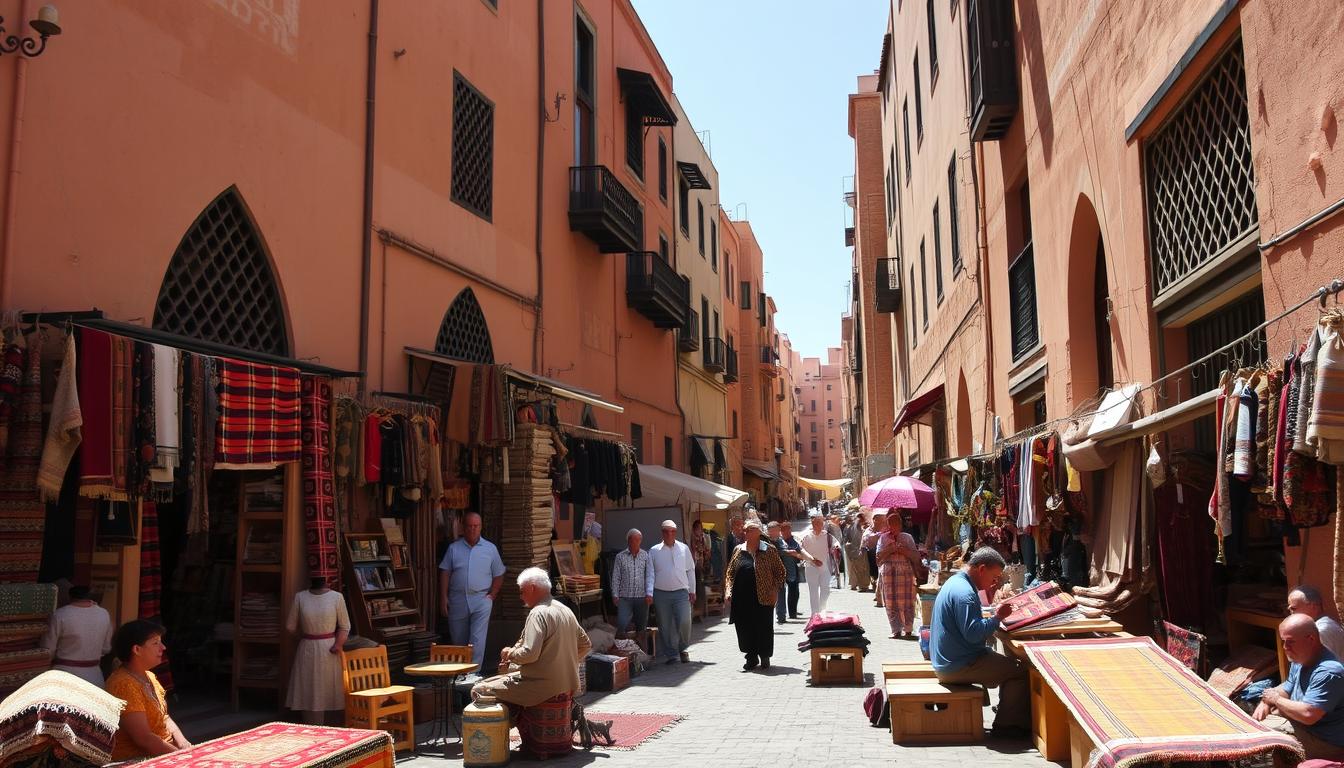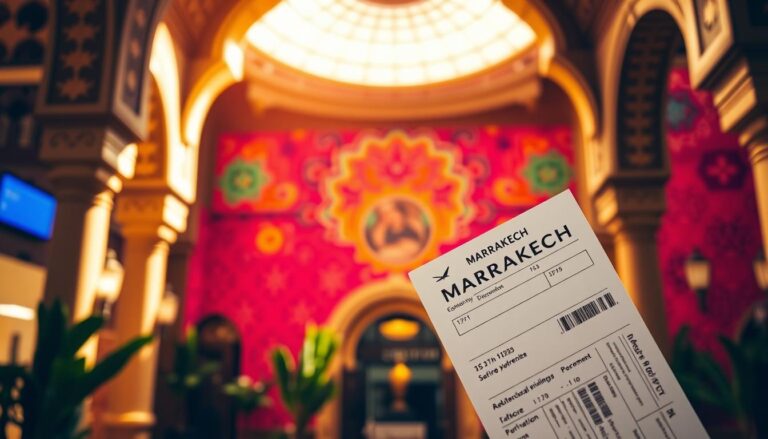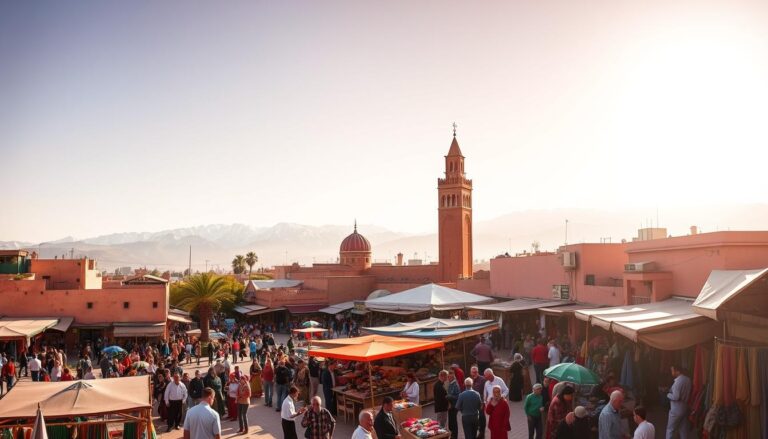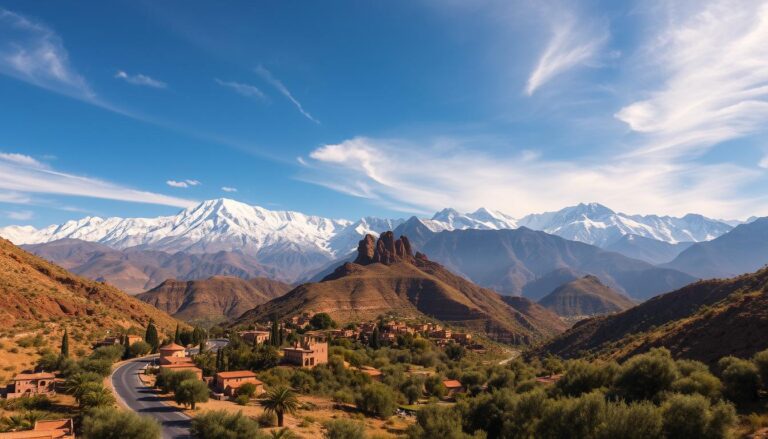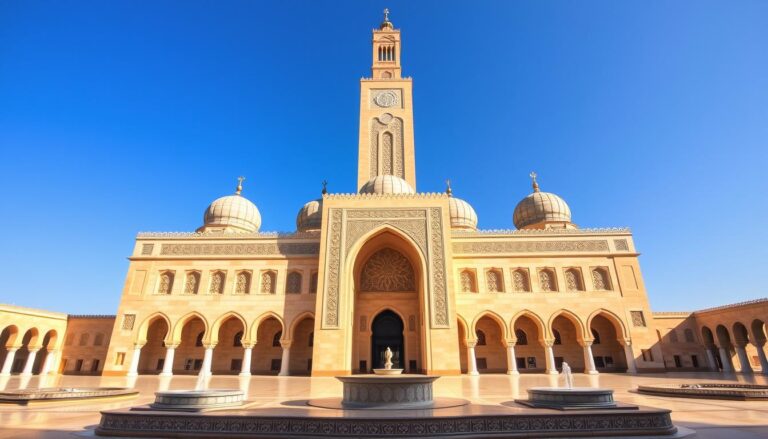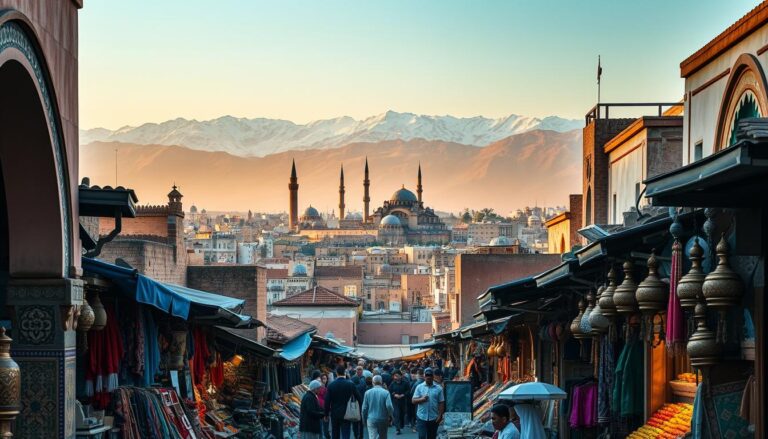Tétouan: Immerse Yourself in the Captivating Culture of Morocco
Table of Contents
In the heart of Northern Morocco, a hidden gem awaits. It offers a world of vibrant colors, rich history, and captivating culture. This city, with its mix of Andalusian and Mediterranean styles, is full of architectural wonders, traditional crafts, and warm hospitality.
Walking through the city’s narrow streets, you’ll see the beauty of its medina. You’ll also find grand historic landmarks and meet friendly people. This city is a place where you can dive deep into its rich culture.
Key Takeaways
- Discover the unique blend of Andalusian and Mediterranean influences in Tétouan’s culture
- Explore the city’s rich history and architectural wonders
- Experience the traditional crafts and warm hospitality of the locals
- Immerse yourself in the vibrant colors and sounds of the medina
- Uncover the grandeur of the city’s historic landmarks
The Hidden Gem of Northern Morocco
When you arrive in Tétouan, you’ll find a city rich in history and culture. Known as “the White Dove,” Tétouan mixes Arab, Berber, and Andalusian traditions. This blend creates a unique cultural experience.
The Unique Character and Significance of Tétouan
Tétouan’s charm comes from its location and history. The medina, a UNESCO World Heritage Site, is a maze of old streets and landmarks. It shows the city’s deep past.
The city’s role in Morocco’s history is significant. It’s a must-see for those who love culture and heritage.
What Makes Tétouan Different from Other Moroccan Cities
Tétouan stands out because of its mix of influences. Its Andalusian and Spanish pasts are seen in its buildings, food, and customs. This makes Tétouan a special place.
Exploring Tétouan, you’ll see it balances old traditions with a modern vibe. This balance is what makes it so charming.
The Rich Historical Tapestry of Tétouan
When you enter Tétouan, you’re surrounded by a rich history. The city’s story spans centuries, shaped by many cultures. You can see this heritage in its buildings, traditions, and culture.
Andalusian Refugees and the Birth of Modern Tétouan
In the 15th century, Andalusian refugees from Spain founded Tétouan. They brought their culture, architecture, and traditions. These influences are still seen in the city’s medina, with its narrow streets and traditional homes.
The Spanish Protectorate Period and Its Influence
In the early 20th century, Spain took control of Tétouan. This period introduced new architectural styles and cultural practices. The Ensanche district, a modern area, was built during this time, alongside the historic medina.
UNESCO World Heritage: The Medina’s Global Importance
In 1997, Tétouan’s medina was named a UNESCO World Heritage Site. This recognition celebrates its unique mix of Andalusian and Spanish cultures. It shows the city’s dedication to preserving its rich heritage.
| Historical Period | Influence on Tétouan | Notable Features |
|---|---|---|
| Andalusian Refugees (15th century) | Cultural and architectural heritage | Narrow streets, traditional houses, Andalusian-style mosques |
| Spanish Protectorate (20th century) | Modern infrastructure, new architectural styles | Ensanche district, Spanish-influenced buildings |
| UNESCO World Heritage (1997) | Global recognition, preservation efforts | Medina conservation, cultural heritage protection |
Planning Your Journey to Tétouan
Going to Tétouan is more than just booking a flight. It’s about timing and getting ready to dive into its amazing culture.
Best Seasons to Experience Tétouan’s Culture
The best time to visit Tétouan is in spring (March to May) and autumn (September to November). The weather is mild and perfect for exploring the city’s rich heritage. Summer is hot, and winters are cool and wet. So, these seasons are great for a Tétouan travel guide plan.
Transportation Options to and Around the City
Tétouan is easy to reach by air through Tangier Ibn Battouta Airport. You can also get there by train and bus from big Moroccan cities. Once you’re in Tétouan, walking or taking a taxi is best. For a real experience, try local transport to explore around.
Where to Stay for an Authentic Experience
For a real stay, live in a traditional riad in the Medina. These charming houses show off Tétouan’s architecture and offer a cozy feel. Book early, especially when lots of people are traveling.
Navigating Tétouan’s Enchanting Medina
Stepping into Tétouan’s medina feels like entering a world of ancient traditions and captivating culture. This UNESCO World Heritage site is a top attraction in Tétouan. It offers a mix of history, architecture, and local customs.

Understanding the Seven Gates and Layout
The medina is surrounded by ancient walls with seven gates, each with its own story. Walking the narrow streets, you’ll see the medina’s layout supports community. It has close-knit neighborhoods and lively souks.
Essential Landmarks Within the Ancient Walls
The medina is filled with landmarks like the Grand Mosque and historic fountains. These sites show the city’s rich history and daily life of its people.
The Grand Mosque and Religious Sites
The Grand Mosque stands out in the medina, showing the city’s cultural and religious heritage. You can also visit smaller mosques and madrasas, adding to the medina’s spiritual feel.
Historic Fountains and Hammams
Historic fountains and hammams are key to the medina’s charm. They serve as social hubs. Hammams, in particular, offer a unique cultural experience where locals socialize and relax.
Shopping in the Souks: Etiquette and Bargaining
Shopping in Tétouan’s souks is an adventure. Knowing local etiquette and bargaining customs is key. Be ready to haggle and walk away if the price isn’t right. With practice, you’ll find unique souvenirs and treasures.
Exploring Tétouan’s medina reveals the city’s rich history, vibrant culture, and warm hospitality. Whether shopping, visiting landmarks, or enjoying the atmosphere, the medina will impress you.
Exploring the Architectural Wonders of Tétouan
As you explore Tétouan, you’ll see a city where different architectural styles come together. The city’s rich history is shown in its buildings, blending Andalusian and Mediterranean styles.
The Royal Palace and Its Andalusian Design
The Royal Palace, or Dar El Makhzen, is a stunning example of Andalusian architecture. Its detailed tile work, carved wood, and ornate plaster ceilings are typical of this style. Even if you can’t go inside, the palace’s exterior is impressive and full of history.
The Spanish-Influenced Ensanche District
The Ensanche district was built during the Spanish protectorate. It brings a European architectural style to Tétouan. The area has wide streets and buildings that mix Spanish and Moorish designs, making it a unique place.
Hidden Riads and Traditional Homes
In Tétouan’s medina, you’ll find hidden riads and traditional homes. These homes have beautiful tiled courtyards, fountains, and detailed interiors. They give a peek into the lives of Tétouan’s people.
Some architectural features to look for in Tétouan include:
- Intricate tile work, known as zellij
- Carved wood and ornate plaster ceilings
- Beautifully tiled courtyards and fountains
- A blend of Andalusian and Mediterranean styles
Exploring Tétouan’s architecture helps you understand the city’s culture and history. It shows how different influences have shaped its buildings.
Immersing in Tétouan’s Artistic Heritage
As you explore Tétouan’s historic streets, you’ll find a city full of history and art. Its artistic heritage mixes old and new, showing off its varied cultural roots.
The National School of Fine Arts: Morocco’s First Art School
The National School of Fine Arts in Tétouan is a key part of Morocco’s art history. It opened in 1919 and has been a hub for local artists ever since. The school teaches both traditional and modern art, giving students a well-rounded education.
The Archaeological Museum and Cultural Centers
The Archaeological Museum in Tétouan tells the city’s story through artifacts. It’s part of a network of cultural centers that celebrate Tétouan’s heritage. These places are vital for keeping the city’s history alive and promoting its culture.
Meeting Local Artisans and Contemporary Artists
Visiting Tétouan lets you meet local artisans and modern artists. The city’s souks and galleries display traditional crafts and modern art. You can talk to artists, learn their methods, and buy unique pieces that show the city’s artistic soul.
Savoring Authentic Tetouani Cuisine
As you explore Tétouan’s streets, the smell of local food invites you to discover its rich flavors. Tétouan’s food is a mix of Moroccan and Andalusian tastes. This blend is seen in the many dishes you can try.
Unique Local Dishes You Must Try
Tétouan offers special dishes, blending seafood with Andalusian flavors.
Seafood Specialties
Being by the sea, Tétouan loves its seafood. Try the grilled fish and seafood paella. They’re made with fresh seafood and spices.
Andalusian-Influenced Recipes
The Andalusian touch is clear in dishes like pastela and rfissa. Pastela is a meat pie with onions and spices. Rfissa is a lentil dish with meat and special bread.
| Dish | Description | Price Range |
|---|---|---|
| Grilled Fish | Fresh fish grilled to perfection | $10-$15 |
| Seafood Paella | A traditional Spanish dish with a Moroccan twist | $15-$20 |
| Pastela | A savory pie filled with meat and spices | $8-$12 |
Best Places to Eat Like a Local
To taste Tétouan’s true flavors, eat at local spots. Here are some places to try:
- Riad Al Andalus for traditional Moroccan cuisine
- Café Central for a variety of pastries and coffee
- Street food stalls in the Medina for fresh and affordable options
Participating in Cooking Classes and Food Tours
Immerse yourself in Tétouan’s food by taking cooking classes or food tours. These experiences let you learn about traditional dishes and the local culture.
Cooking classes teach you to make several local dishes. You get to make and enjoy your food. Food tours, meanwhile, show you the city’s best food spots. You’ll visit local eateries and discover hidden gems.
Cultural Immersion Activities in Tétouan
Dive into Tétouan’s lively culture through its crafts, music, and festivals. This city is all about keeping its traditions alive. You can meet local artisans, musicians, and dancers.
Traditional Craft Workshops
Tétouan is famous for its crafts like leatherwork, textiles, and pottery. You can join workshops to learn from local experts. For example, you can try making traditional Moroccan pottery.
| Craft | Description | Location |
|---|---|---|
| Leatherwork | Intricately designed leather goods | Medina Souks |
| Textiles | Handwoven fabrics and garments | Local Markets |
| Pottery | Traditional clay pottery | Artisan Workshops |
Music and Dance Traditions
Tétouan’s music scene is rich with Andalusian classical and Gnawa rhythms. You can watch performances or join music and dance workshops. Cultural centers in the city often host events to showcase local talent.
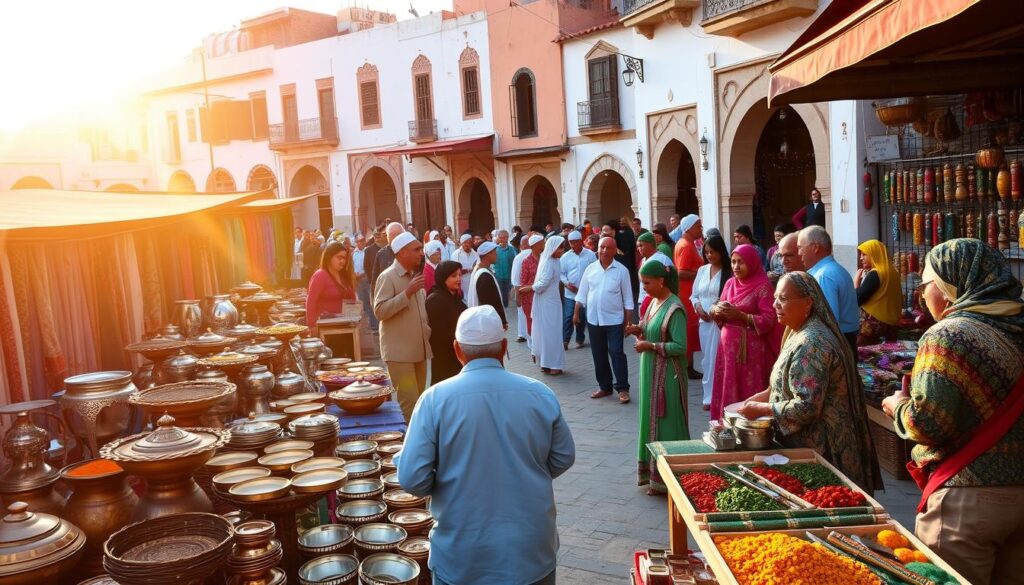
Participating in Local Festivals and Celebrations
Tétouan hosts many festivals, like the Tétouan International Cultural Festival. These events let you see the city’s cultural diversity and community spirit. You can enjoy traditional food, music, and dance.
By taking part in these activities, you’ll understand Tétouan’s heritage better. You’ll also make memories that will last a lifetime.
Day Trips from Tétouan
Tétouan is a great spot for day trips. You can visit charming towns, relax on beautiful beaches, or explore stunning mountains. There’s something for everyone.
The Blue City of Chefchaouen
Chefchaouen is a short drive from Tétouan. It’s a beautiful town in the Rif Mountains. Known for its blue buildings, it’s perfect for photographers and those looking for peace.
Mediterranean Beaches: Martil, M’diq, and Cabo Negro
The Mediterranean coast has amazing beaches for a day trip. Martil, M’diq, and Cabo Negro are great for swimming, sunbathing, and water sports. You can also enjoy fresh seafood and local hospitality.
Hiking in the Rif Mountains
The Rif Mountains are perfect for adventure seekers. They have many hiking trails with beautiful views. You can see scenic valleys, visit villages, and enjoy nature.
Guided hikes are available for those who want to learn more about the area’s plants and animals.
| Destination | Main Attraction | Activities |
|---|---|---|
| Chefchaouen | Blue-painted buildings | Sightseeing, photography |
| Martil, M’diq, Cabo Negro | Beautiful beaches | Swimming, water sports, seafood |
| Rif Mountains | Scenic landscapes | Hiking, exploring villages |
Practical Tips for Your Tétouan Adventure
For a memorable trip to Tétouan, follow these tips. They will make your visit more enjoyable. Knowing the local customs and being prepared is key.
Essential Arabic and Spanish Phrases
Learning basic phrases in Arabic and Spanish is helpful. Saying “As-salamu alaykum” (peace be upon you) in Arabic or “Hola” (hello) in Spanish can win you friends. Use a translation app or carry a phrasebook to communicate.
Cultural Etiquette and Respectful Behavior
Dressing modestly is important in Tétouan. Women should cover their shoulders and knees. Men should wear clothes that cover their bodies well.
When visiting mosques or homes, remove your shoes. Be careful with your body language and avoid public displays of affection.
Safety, Money, and Health Considerations
Stay safe by keeping valuables secure and being aware of your surroundings. Avoid carrying too much cash. Morocco uses the dirham, and credit cards are accepted in many places. Still, it’s good to have some local currency for small buys.
Drink plenty of water and protect yourself from the sun. This will help you stay healthy during your trip.
Conclusion: Carrying the Spirit of Tétouan Home
As you finish your trip to Tétouan, the memories of this magical city will stay with you. From the moment you entered the medina, you were surrounded by rich history and vibrant culture. You saw how Andalusian and Spanish influences make Tétouan a unique gem in Northern Morocco.
When you share your stories and memories, you inspire others to see Tétouan’s wonders. You might have walked through souks, tried local food, or joined in cultural events. These experiences made you a part of Tétouan’s living heritage. The things you did in Tétouan touched your heart, and you can’t wait to go back.
Tétouan tourism is more than just visiting a place; it’s about living a way of life. As you carry Tétouan’s spirit with you, you become a part of its story. Its charm will keep captivating you. Let Tétouan’s memories inspire you to return, and soon you’ll be back, ready to discover more.

